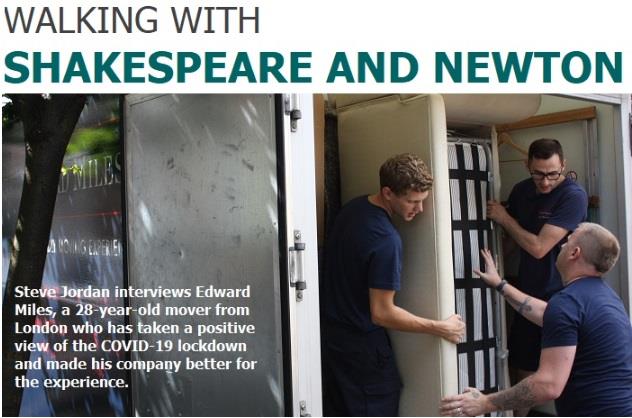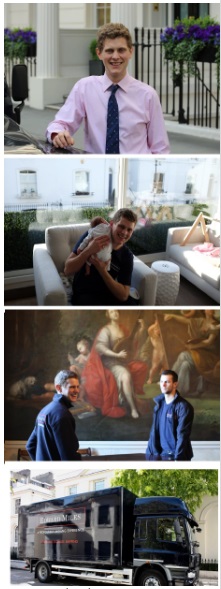Steve Jordan interviews Edward Miles, a 28-year-old mover from London who has taken a positive view of the COVID-19 lockdown and made his company better for the experience.

I have just read a book. It’s called We have no idea: a guide to an unknown universe by Daniel Whiteson and Jorge Cham, a couple of seemingly rather wacky scientists. They say that despite our undoubted human achievements, we really do have no idea about most things. How big the universe is, what shape it might be, how many galaxies it contains, whether it’s infinite and, if it were, what would that mean … we don’t even know what 95% of the universe is made of. And that’s before you get to all the philosophical stuff such as: why are we here anyway? In fact, we don’t know much at all really.
Which is why it came to me as no great surprise that immediately after writing my leader story for April, and before the issue was published, I had a call from someone I didn’t know telling me exactly what I had just described. Call it coincidence if you like but, as Messrs Whiteson and Cham have already admirably demonstrated, we really have no idea what forces are at work to guide our lives.
 The call was from a young man called Edward Miles who runs a moving company in London. My leader had said, in part at least, that people would take the opportunity of the COVID-19 global lockdown to work on their businesses, not in them. That this enforced ‘holiday’, right at the start of the manic season, would give people the opportunity to reflect on what they do, and how they do it, enabling them to come out of this mess stronger than they went in. Edward had just done exactly that. Allow me to explain.
The call was from a young man called Edward Miles who runs a moving company in London. My leader had said, in part at least, that people would take the opportunity of the COVID-19 global lockdown to work on their businesses, not in them. That this enforced ‘holiday’, right at the start of the manic season, would give people the opportunity to reflect on what they do, and how they do it, enabling them to come out of this mess stronger than they went in. Edward had just done exactly that. Allow me to explain.
Edward Miles has been involved with the moving industry since birth with a family moving history going back generations. At 18 he did an apprenticeship with Bishop’s in London before returning briefly to the family business in Reading. But, at the tender age of 22, he decided to go it alone. He wanted his own company, in London, serving high net worth customers.
Six years on, that’s exactly what he has. He started the company with Laura, three months before they got married. Now they have four full-time employees, an expanding vehicle fleet, a positive balance sheet and a fabulous livery that makes them look as if they have been serving the community for 100 years. All’s well then. But this is the ‘soon to be famous’ spring of 2020. Nothing is well.
On 6 February Edward made another bold decision. He bought a company three times bigger than his own: Dracott and Fennemore, with premises close to Heathrow airport. “It was a reverse takeover,” said Edward. “We were really busy for the first month, then everything came to a halt.”
British Prime Minister Boris Johnson announced on 23 March that the whole of the UK was in lockdown to try to control the COVID-19 outbreak. “That evening I had a bit of a panic,” said Edward. After talking things over with Laura, they decided not to take any chances. Although the government hadn’t banned removals, Edward Miles would close until he felt it was safe once again to send his crews back to work.
“There was a lot of uncertainty about what we could and couldn't do so I decided to take a lead and tell everybody our position straight away,” he explained. “Now our office people are working from home and all the outside staff have furloughed. The phones were ringing off the hook but I explained that we could not move anyone. So we did the surveys remotely and gave quotations so we are ready for when we can open again. It was probably the most stressful week I had ever had.”
At the time of the interview (10 April) Edward had been working from home for two weeks. He had seen that the new company was not generating the same profit margin as his own, and he wanted to know more. “I've looked at all the moves we did in the last six months and done a lot of Excel spreadsheets,” he said. “We have reverse-costed all of them to see which ones made profit, which ones didn't, and why. This has enabled me to pinpoint where the profit is coming from and will help me decide what I want to change when the business comes back.”
Edward explained that it was only because of the lockdown that he was able to do this exercise that has proved to be so valuable. “If it hadn’t been for the lockdown I would never have had the time to do this; the first opportunity would have been in January or February next year by which time I would have wasted a whole year’s worth of trading.”
Edward reminded me of the stories of Willian Shakespeare who, during an outbreak of plague in 1606, when the theatres were closed, produced King Lear and Macbeth; and nearly 60 years later, when the country was again in lockdown and Cambridge University was closed, Sir Isaac Newton returned home to isolation where he did some of his finest work, including developing the theories of differential calculus and the laws of motion that would change mathematics forever. “I’m no Shakespeare or Newton,” said Edward, “but I do appreciate having a quiet place to get my work done.”
So, Edward is very positive about the future. He believes that his customers have just postponed their moves and will come back when the company reopens; and he will restart his company in line with government advice and as soon as he believes it is safe to do so. He’s already recruiting for the post-COVID boom. But without this enforced moment of reflection, his company, especially his new acquisition, would be looking very different.